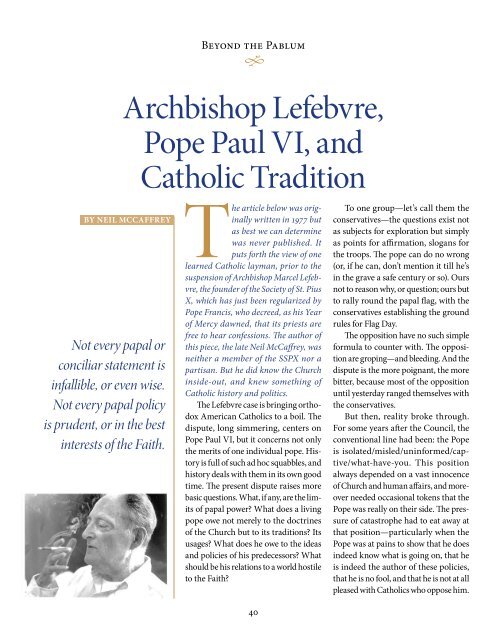You also want an ePaper? Increase the reach of your titles
YUMPU automatically turns print PDFs into web optimized ePapers that Google loves.
Beyond the Pablum<br />
Archbishop Lefebvre,<br />
Pope Paul VI, and<br />
Catholic Tradition<br />
BY NEIL MCCAFFREY<br />
Not every papal or<br />
conciliar statement is<br />
infallible, or even wise.<br />
Not every papal policy<br />
is prudent, or in the best<br />
interests of the Faith.<br />
The article below was originally<br />
written in 1977 but<br />
as best we can determine<br />
was never published. It<br />
puts forth the view of one<br />
learned Catholic layman, prior to the<br />
suspension of Archbishop Marcel Lefebvre,<br />
the founder of the Society of St. Pius<br />
X, which has just been regularized by<br />
Pope Francis, who decreed, as his Year<br />
of Mercy dawned, that its priests are<br />
free to hear confessions. The author of<br />
this piece, the late Neil McCaffrey, was<br />
neither a member of the SSPX nor a<br />
partisan. But he did know the Church<br />
inside-out, and knew something of<br />
Catholic history and politics.<br />
The Lefebvre case is bringing orthodox<br />
American Catholics to a boil. The<br />
dispute, long simmering, centers on<br />
Pope Paul VI, but it concerns not only<br />
the merits of one individual pope. History<br />
is full of such ad hoc squabbles, and<br />
history deals with them in its own good<br />
time. The present dispute raises more<br />
basic questions. What, if any, are the limits<br />
of papal power? What does a living<br />
pope owe not merely to the doctrines<br />
of the Church but to its traditions? Its<br />
usages? What does he owe to the ideas<br />
and policies of his predecessors? What<br />
should be his relations to a world hostile<br />
to the Faith?<br />
40<br />
To one group—let’s call them the<br />
conservatives—the questions exist not<br />
as subjects for exploration but simply<br />
as points for affirmation, slogans for<br />
the troops. The pope can do no wrong<br />
(or, if he can, don’t mention it till he’s<br />
in the grave a safe century or so). Ours<br />
not to reason why, or question; ours but<br />
to rally round the papal flag, with the<br />
conservatives establishing the ground<br />
rules for Flag Day.<br />
The opposition have no such simple<br />
formula to counter with. The opposition<br />
are groping—and bleeding. And the<br />
dispute is the more poignant, the more<br />
bitter, because most of the opposition<br />
until yesterday ranged themselves with<br />
the conservatives.<br />
But then, reality broke through.<br />
For some years after the Council, the<br />
conventional line had been: the Pope<br />
is isolated/misled/uninformed/captive/what-have-you.<br />
This position<br />
always depended on a vast innocence<br />
of Church and human affairs, and moreover<br />
needed occasional tokens that the<br />
Pope was really on their side. The pressure<br />
of catastrophe had to eat away at<br />
that position—particularly when the<br />
Pope was at pains to show that he does<br />
indeed know what is going on, that he<br />
is indeed the author of these policies,<br />
that he is no fool, and that he is not at all<br />
pleased with Catholics who oppose him.


